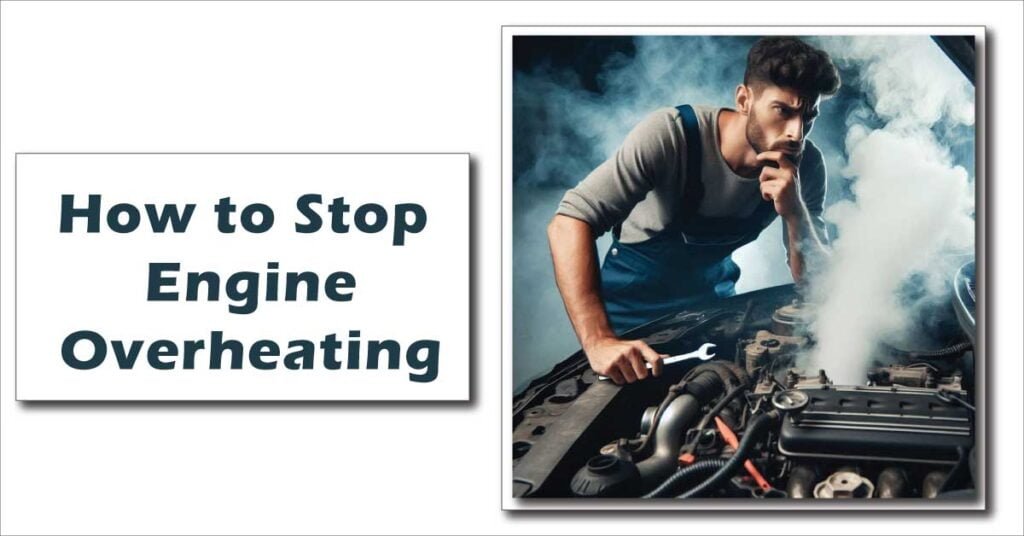How to prevent engine overheating is essential for maintaining your vehicle’s performance and extending its lifespan. An overheated engine can cause expensive repairs and serious damage, making proactive measures vital. This article offers practical advice on how to stop engine overheating, including maintenance tips to help you avoid issues and keep your car running smoothly.
Understanding Engine Overheating
Before diving into prevention, it’s important to understand why engines overheat. Engine overheating occurs when the engine temperature rises beyond the safe operating range, often due to issues with the cooling system, radiator, or coolant levels. Knowing these causes can help in avoiding engine overheating and addressing potential problems early.
Tips to Prevent Engine Overheating
1- Regular Engine Checks
One of the most effective ways to prevent engine overheating is to perform regular engine checks. Regular inspections can help identify potential issues before they escalate.
1- Check coolant levels: Ensure that your coolant levels are adequate. Low coolant can lead to overheating as it reduces the system’s ability to regulate temperature.
2- Inspect hoses and belts: Regularly check the condition of hoses and belts in the cooling system. Look for any signs of wear or leaks that could affect performance.
2- Engine Cooling Maintenance
Maintaining the engine cooling system is essential for preventing car overheating. The cooling system is responsible for regulating engine temperature and needs regular attention.
1- Coolant system maintenance: Regularly flush and replace the coolant according to your vehicle’s manufacturer recommendations. Old or contaminated coolant can lose its effectiveness, leading to overheating.
2- Radiator care tips: Keep the radiator clean and free from debris. A clogged radiator can restrict airflow and reduce its ability to dissipate heat.
3- Regular Radiator Care
The radiator plays a crucial role in engine overheating prevention. Proper radiator care ensures it functions effectively.
1- Clean the radiator: Periodically clean the radiator to remove any dirt or debris that might block airflow. This helps maintain optimal cooling performance.
2- Check radiator fluid: Regularly check the radiator fluid levels and top up as needed. Low radiator fluid can lead to insufficient cooling and overheating.
4- Coolant System Maintenance
Proper maintenance of the coolant system is vital for preventing engine overheating. The coolant system includes several components that work together to regulate engine temperature.
1- Monitor coolant quality: Use the recommended type of coolant for your vehicle and avoid mixing different types. Check the quality of the coolant regularly and replace it if it appears contaminated or degraded.
2- Inspect the water pump: Ensure the water pump is functioning correctly, as it circulates coolant throughout the engine. A failing water pump can lead to overheating.
5- Regular Engine Checks
Performing regular engine checks is essential for maintaining engine health and preventing overheating.
1- Conduct routine maintenance: Follow your vehicle’s maintenance schedule for regular oil changes, filter replacements, and other routine services. Well-maintained engines are less likely to overheat.
2- Listen for unusual noises: Pay attention to any unusual noises coming from the engine, such as whining or grinding sounds. These could indicate issues with the cooling system or other components.
6- Summer Car Maintenance Tips
During the hot summer months, your engine is more susceptible to overheating. Here are some summer car maintenance tips to help keep your engine cool:
1- Keep the car in the shade: Whenever possible, park your car in the shade to reduce the heat exposure on the engine. This helps prevent excessive temperature rise.
2- Use air conditioning wisely: While air conditioning can help keep the cabin cool, it can also put additional strain on the engine. Use it sparingly to avoid unnecessary overheating.
7- Understanding and Preventing Causes of Engine Overheating
To effectively prevent engine overheating, it’s important to understand the common causes and address them proactively.
1- Identify potential issues early: Regular inspections and maintenance can help you identify issues such as coolant leaks, radiator blockages, or failing thermostats before they lead to overheating.
2- Address problems promptly: If you notice any signs of overheating, such as a rising temperature gauge or steam coming from under the hood, take immediate action to address the issue and avoid further damage.

How to Stop Engine Overheating: Practical Steps
If your engine does overheat despite your best efforts, here are practical steps to stop engine overheating and manage the situation:
Pull Over Safely
When you notice signs of overheating, such as a high temperature gauge or steam, pull over to a safe location as soon as possible. Continuing to drive with an overheated engine can cause severe damage.
Turn Off the Engine
Turn off the engine to stop the heat buildup and allow the engine to cool down. Avoid opening the hood or radiator cap until the engine has cooled, as the coolant can be extremely hot.
Check Coolant Levels
Once the engine has cooled, check the coolant levels and top up as needed. If you see signs of coolant leaks or other issues, address them promptly.
Inspect for Leaks and Damage
Look for any visible signs of leaks or damage in the coolant system. Addressing leaks and repairing any damage can help prevent future overheating.
Seek Professional Help
If you’re unable to resolve the issue on your own or if the overheating persists, it’s best to seek professional assistance. A qualified mechanic can diagnose the problem and perform any necessary repairs to prevent further overheating.
Also Read Our Latest Post:
Conclusion About How to Prevent Engine Overheating
Preventing engine overheating is essential for maintaining your vehicle’s performance and avoiding costly repairs. By following these tips, including regular engine checks, engine cooling maintenance, and radiator care tips, you can keep your engine in optimal condition and avoid overheating issues. Proactive maintenance and timely attention to potential problems are key to ensuring that your vehicle runs smoothly and reliably.

